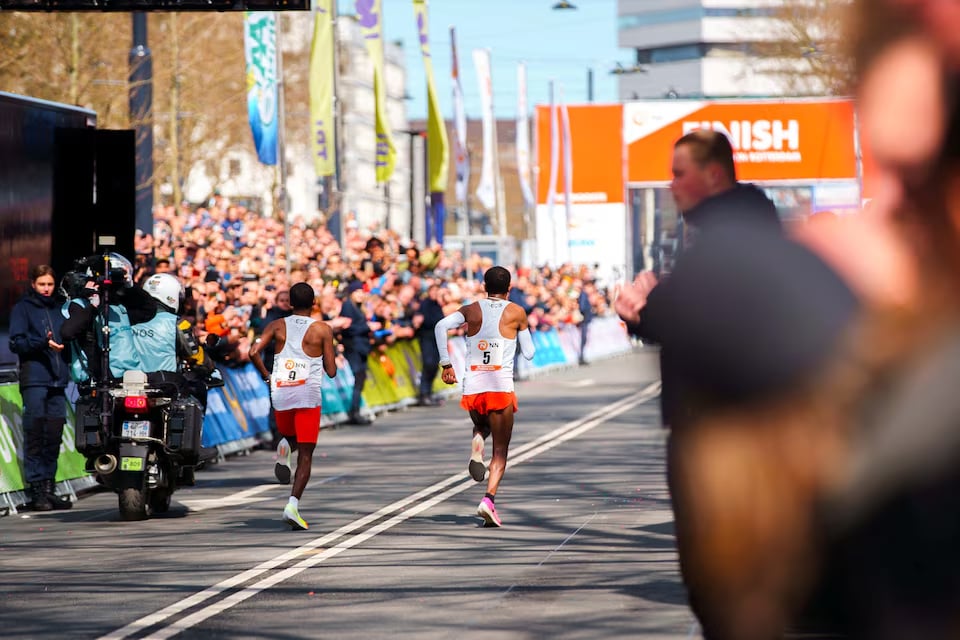Some Olympic athletes are using a new tool they hope will boost their medal chances this summer: tiny monitors that attach to the skin to track blood glucose levels.
The market for continuous glucose monitors (CGMs), developed to help diabetes patients fine-tune their insulin shots, is already worth billions of dollars per year.
Manufacturers are eyeing further growth in the sport and wellness sector, where top athletes could be trend-setters.
What are CGMs?
CGMs are coin-size skin patches with a wireless link to a smartphone. With the help of an applicator needle, a tiny sensor filament is pierced into the upper arm to measure glucose between cells just underneath the skin. The adhesive patch holds the sensor in place for up to two weeks.
Current models have become smaller and more precise and no longer need separate receiver hardware.
How are athletes using CGMs?
Some top athletes and their support staff use CGMs to assess calorie intake and workout intensity. The benefit during races lasting less than about three hours is seen as limited.
Retired Australian swimmer and Olympic gold medallist Chelsea Hodges says CGMs helped her remedy bouts of extreme exhaustion during longer training sessions. Minute-by-minute monitoring showed she was prone to sagging blood glucose levels.
Dutch marathoner Abdi Nageeye won silver at the Tokyo Olympics. Seeking an "effortless run", Nageeye is using CGMs to improve sleeping and eating patterns so that he expends a minimum of energy during training.
Swedish steeplechaser Emil Blomberg, another Tokyo Olympian seeking to qualify for Paris, said he used CGMs to prevent overtraining. The devices also helped him work out that he needs to eat more during longer training sessions.
Is use of CGMs fair?
Cycling's world governing body UCI in 2021 banned the non-medical use of CGMs during races "to ensure the respect of individual qualities, the spirit of competition, and fairness" but other major sports have not followed suit.
Some athletes say the cost of CGMs - Abbott's Lingo device, available in Britain, costs 120-150 pounds ($152-190) per month - can be prohibitive without a sponsorship deal.
Sports nutrition researchers say benefits have so far been anecdotal, with no clear evidence CGMs give a competitive edge.
What is the science behind CGMs in sports?
Understanding how glucose tracking can inform an athlete's calorie intake and training schedule is still in its infancy.
Using up more energy in training than calories available from food, for example, can over time compromise bone strength, the immune system and fertility. However, it has not yet been fully established how CGMs can help avoid that.
Among some surprise research findings, elite marathoners have remarkably high blood glucose levels during races, likely boosted by stress hormones. Many endurance athletes have extremely low glucose levels during pre-dawn sleep but it's not clear whether that is detrimental.
Researchers told Reuters that most of their CGM advisory work for athletes without diabetes is for now based on anecdotal observations rather than validated findings.
What CGMs are available for non-diabetics?
Companies like Levels, Nutrisense and Signos offer apps and programmes for non-diabetics to use in combination with diabetes devices made by Dexcom or Abbott. The programme providers are not directly associated with the manufacturers.
Abbott in 2020 launched the CGM Libre Sense Glucose Sport Biosensor for athletes without diabetes in a number of European countries. It was exclusively available via a collaboration with app developer Supersapiens, but that company shut in February.
CEO Phil Southerland told Sports Business Journal that a capital increase had fallen flat and he would seek to relaunch with a U.S. focus. He did not respond to requests for comment.
Abbott in January launched a CGM with a coaching app in Britain, branded Lingo, for "overall health and wellbeing". The group is next looking to launch in the U.S..
($1 = 0.7863 pounds)


















































